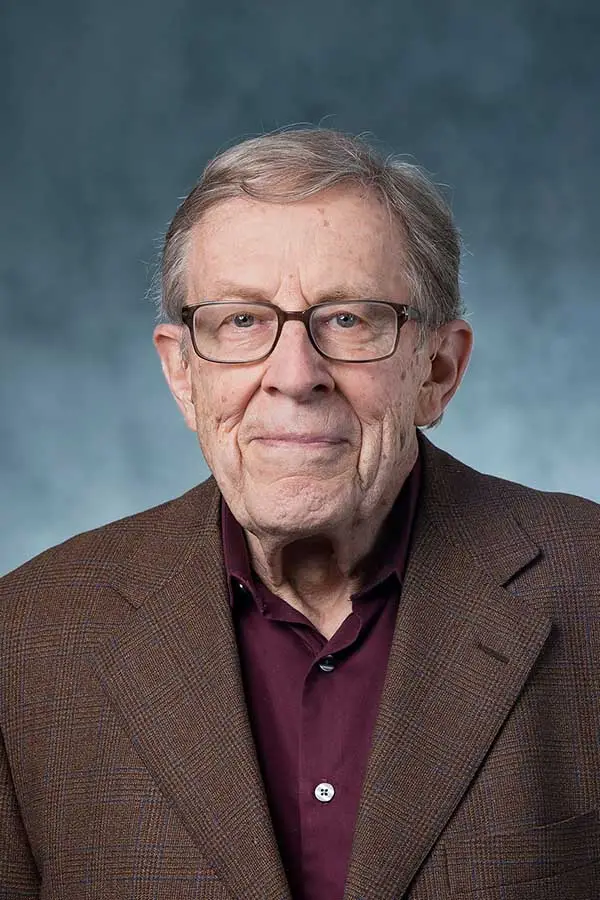Carnegie Mellon Mourns Trustee Lowell Steinbrenner
Media Inquiries
The Carnegie Mellon University community is mourning alumnus, benefactor and Emeritus Trustee Lowell Steinbrenner, who passed away this week at age 90.
A double alumnus of the university who was born in Butler, Pennsylvania, Steinbrenner was elected to the CMU Board of Trustees in 2000, earning emeritus status in 2008. His university volunteer service was extensive, including roles on the advisory boards for the departments of Civil and Environmental Engineering, Engineering and Public Policy, Materials Science and Engineering, Philosophy, and Physics. He also served on the Qatar Oversight Committee and the Executive Committee for the Inspire Innovation campaign.
“Lowell’s contributions to our campus community span decades and take numerous forms,” CMU President Farnam Jahanian(opens in new window) said. “As an alumnus, trustee and benefactor, he worked to strengthen Carnegie Mellon University’s reputation and impact, and he excelled in this work. I am grateful for his many contributions to CMU and, on behalf of our community, extend my deepest condolences to his wife, Jan, and beloved family during this difficult time.”
In 2004, Lowell and Jan Steinbrenner established the Steinbrenner Institute for Environmental Education and Research(opens in new window), which aims to change the way the world thinks and acts about the environment. In making the gift, Steinbrenner noted, "Because of social, economic and political circumstances, we undoubtedly will have to radically change our habits with regard to our natural resources.”
Over its two decades, the institute has provided fellowship support to more than 60 graduate students. Within the past five years, it led the launch(opens in new window) of an interdisciplinary additional major and minor in environmental and sustainability studies for undergraduate students within any of CMU’s colleges, which has grown in enrollment rapidly. In addition, the institute provides research grants for undergraduate students and sponsors academic events, including its annual Sustainability Symposium. More than 30 faculty across multiple disciplines are affiliated with the institute.
“Lowell was extremely engaged with the institute’s activities, and was inquisitive and thoughtful about our work. He was a wonderful sounding board,” said Neil Donahue(opens in new window), Thomas Lord University Professor of Chemistry and director of the Steinbrenner Institute. “I was, obviously, grateful for the resources he and Jan provided, but also grateful for his enthusiasm — it was rewarding to see him excited about something we were doing. We shared the recognition that sustainability and the environment are an existential issue that is very hard and entwined in everything. When he was on campus, he would frequently come through my office after an event he had attended with the question, ‘Why didn’t people bring up climate?’ I really appreciated that.”
Over their decades of generosity to CMU, the Steinbrenners also provided regular support to Dietrich College of Humanities and Social Sciences, including the Data-Driven Diversity Lab, which works to understand and improve how different groups experience student success, thriving and sense of belonging on campus. In the late 1990s, they funded an ethics projected titled “Integrating Business and Ethics into the Engineering Curriculum.” As a result of his interest in humanism, the couple advocated for and supported an initiative in the area as well as the campus Humanist League student organization.
"Because of social, economic and political circumstances, we undoubtedly will have to radically change our habits with regard to our natural resources.” — Lowell Steinbrenner
“Lowell was sad about the direction of the world, not just with regard to climate, but also racism, free speech and other issues,” said Richard Scheines(opens in new window), the Bess Family Dean of the Dietrich College. “He was a very engaged and socially caring person who was at the part of his life where he felt he should give back to make things better. Once or twice a year, he would make an appointment, come to my office, make super strong black coffee, and then grill me on how I was ensuring that the college was taking on the world’s problems. I felt honored that we were one of the places that he invested his time and money. He really cared about what we were doing.”
Steinbrenner earned bachelor’s and master’s degrees in metallurgical engineering from the Carnegie Institute of Technology in 1955 and 1960, respectively. He was a second-generation alumnus; his father, Walter John Steinbrenner, studied mechanical drafting in night school at Carnegie Tech. Lowell Steinbrenner later earned a master of divinity from Harvard University, and studied international economics at Boston University.
Steinbrenner was the retired founder, chairman and CEO of Contours, Ltd. The Orrville, Ohio, manufacturer of steel and ore was founded by Steinbrenner in 1970, becoming one of the world’s largest and most diversified producers of flat and shaped steel wires. When acquired by Bekaert Corporation in 2003, the company was shipping more than 34,000 tons of products annually.
In 1982, he was elected to the Ohio Senate for the Ohio 19th senatorial district, serving until 1985. He later participated in a USAID economic development project and was a member of an environmental assessment project in China.
Before he co-founded Contours, Steinbrenner was employed by Jones & Laughlin Steel Corporation, Armco Company and Philadelphia Steel & Wire Specialty.
Steinbrenner founded the Unitarian Universalist Fellowship of Wayne County in Wooster, Ohio. He was a member of the President’s Council of the Unitarian Universalist Fellowship (UUF), as well as a board member of the Church of the Larger Fellowship (a UUF organization) and Boston Unitarian Church.
“He was just a lovely, lovely man, and this is a painful loss,” Scheines said. “I’m so grateful he took such an interest in Carnegie Mellon and the ways in which we could make a difference in the world.”
